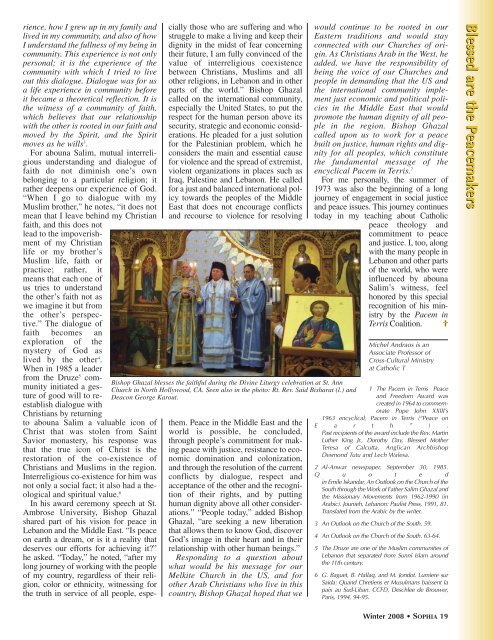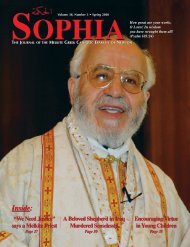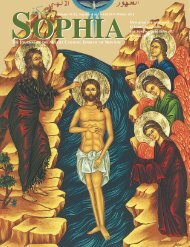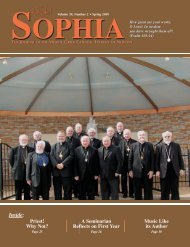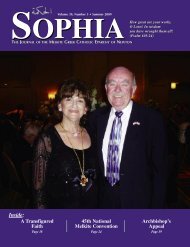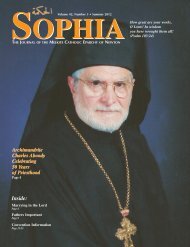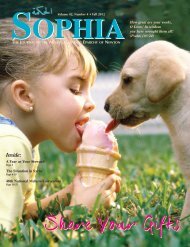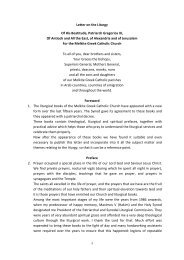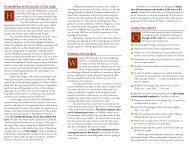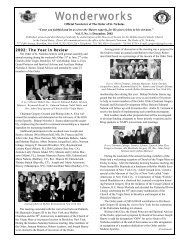Sophia - Melkite Eparchy of Newton
Sophia - Melkite Eparchy of Newton
Sophia - Melkite Eparchy of Newton
- No tags were found...
You also want an ePaper? Increase the reach of your titles
YUMPU automatically turns print PDFs into web optimized ePapers that Google loves.
ience, how I grew up in my family andlived in my community, and also <strong>of</strong> howI understand the fullness <strong>of</strong> my being incommunity. This experience is not onlypersonal; it is the experience <strong>of</strong> thecommunity with which I tried to liveout this dialogue. Dialogue was for usa life experience in community beforeit became a theoretical reflection. It isthe witness <strong>of</strong> a community <strong>of</strong> faith,which believes that our relationshipwith the other is rooted in our faith andmoved by the Spirit, and the Spiritmoves as he wills 3 .For abouna Salim, mutual interreligiousunderstanding and dialogue <strong>of</strong>faith do not diminish one’s ownbelonging to a particular religion; itrather deepens our experience <strong>of</strong> God.“When I go to dialogue with myMuslim brother,” he notes, “it does notmean that I leave behind my Christianfaith, and this does notlead to the impoverishment<strong>of</strong> my Christianlife or my brother’sMuslim life, faith orpractice; rather, itmeans that each one <strong>of</strong>us tries to understandthe other’s faith not aswe imagine it but fromthe other’s perspective.”The dialogue <strong>of</strong>faith becomes anexploration <strong>of</strong> themystery <strong>of</strong> God aslived by the other 4 .When in 1985 a leaderfrom the Druze 5 communityinitiated a gesture<strong>of</strong> good will to reestablishdialogue withChristians by returningto abouna Salim a valuable icon <strong>of</strong>Christ that was stolen from SaintSavior monastery, his response wasthat the true icon <strong>of</strong> Christ is therestoration <strong>of</strong> the co-existence <strong>of</strong>Christians and Muslims in the region.Interreligious co-existence for him wasnot only a social fact; it also had a theologicaland spiritual value. 6In his award ceremony speech at St.Ambrose University, Bishop Ghazalshared part <strong>of</strong> his vision for peace inLebanon and the Middle East. “Is peaceon earth a dream, or is it a reality thatdeserves our efforts for achieving it?”he asked. “Today,” he noted, “after mylong journey <strong>of</strong> working with the people<strong>of</strong> my country, regardless <strong>of</strong> their religion,color or ethnicity, witnessing forthe truth in service <strong>of</strong> all people, especiallythose who are suffering and whostruggle to make a living and keep theirdignity in the midst <strong>of</strong> fear concerningtheir future, I am fully convinced <strong>of</strong> thevalue <strong>of</strong> interreligious coexistencebetween Christians, Muslims and allother religions, in Lebanon and in otherparts <strong>of</strong> the world.” Bishop Ghazalcalled on the international community,especially the United States, to put therespect for the human person above itssecurity, strategic and economic considerations.He pleaded for a just solutionfor the Palestinian problem, which heconsiders the main and essential causefor violence and the spread <strong>of</strong> extremist,violent organizations in places such asIraq, Palestine and Lebanon. He calledfor a just and balanced international policytowards the peoples <strong>of</strong> the MiddleEast that does not encourage conflictsand recourse to violence for resolvingBishop Ghazal blesses the faithful during the Divine Liturgy celebration at St. AnnChurch in North Hollywood, CA. Seen also in the photo: Rt. Rev. Said Bisharat (l.) andDeacon George Karout.them. Peace in the Middle East and theworld is possible, he concluded,through people’s commitment for makingpeace with justice, resistance to economicdomination and colonization,and through the resolution <strong>of</strong> the currentconflicts by dialogue, respect andacceptance <strong>of</strong> the other and the recognition<strong>of</strong> their rights, and by puttinghuman dignity above all other considerations.”“People today,” added BishopGhazal, “are seeking a new liberationthat allows them to know God, discoverGod’s image in their heart and in theirrelationship with other human beings.”Responding to a question aboutwhat would be his message for our<strong>Melkite</strong> Church in the US, and forother Arab Christians who live in thiscountry, Bishop Ghazal hoped that wewould continue to be rooted in ourEastern traditions and would stayconnected with our Churches <strong>of</strong> origin.As Christians Arab in the West, headded, we have the responsibility <strong>of</strong>being the voice <strong>of</strong> our Churches andpeople in demanding that the US andthe international community implementjust economic and political policiesin the Middle East that wouldpromote the human dignity <strong>of</strong> all peoplein the region. Bishop Ghazalcalled upon us to work for a peacebuilt on justice, human rights and dignityfor all peoples, which constitutethe fundamental message <strong>of</strong> theencyclical Pacem in Terris. 7For me personally, the summer <strong>of</strong>1973 was also the beginning <strong>of</strong> a longjourney <strong>of</strong> engagement in social justiceand peace issues. This journey continuestoday in my teaching about Catholicpeace theology andcommitment to peaceand justice. I, too, alongwith the many people inLebanon and other parts<strong>of</strong> the world, who wereinfluenced by abounaSalim’s witness, feelhonored by this specialrecognition <strong>of</strong> his ministryby the Pacem inTerris Coalition. †Michel Andraos is anAssociate Pr<strong>of</strong>essor <strong>of</strong>Cross-Cultural Ministryat Catholic T1 The Pacem in Terris Peaceand Freedom Award wascreated in 1964 to commemoratePope John XXIII’s1963 encyclical, Pacem in Terris (“Peace onE a r t h ” ) .Past recipients <strong>of</strong> the award include the Rev. MartinLuther King Jr., Dorothy Day, Blessed MotherTeresa <strong>of</strong> Calcutta, Anglican ArchbishopDesmond Tutu and Lech Walesa.2 Al-Anwar newspaper, September 30, 1985.Q u o t e din Emile Iskandar, An Outlook on the Church <strong>of</strong> theSouth through the Work <strong>of</strong> Father Salim Ghazal andthe Missionary Movements from 1962-1990 (inArabic). Jounieh, Lebanon: Paulist Press, 1991, 81.Translated from the Arabic by the writer.3 An Outlook on the Church <strong>of</strong> the South. 59.4 An Outlook on the Church <strong>of</strong> the South. 63-64.5 The Druze are one <strong>of</strong> the Muslim communities <strong>of</strong>Lebanon that separated from Sunni Islam aroundthe 11th century.6 G. Baguet, B. Hallaq, and M. Jondot. Lumiere surSaida: Quand Chretiens et Musulmans baissent lapaix au Sud-Liban. CCFD, Deschlee de Brouwer,Paris, 1994, 94-95.Blessed are the PeacemakersWinter 2008 • SOPHIA 19


